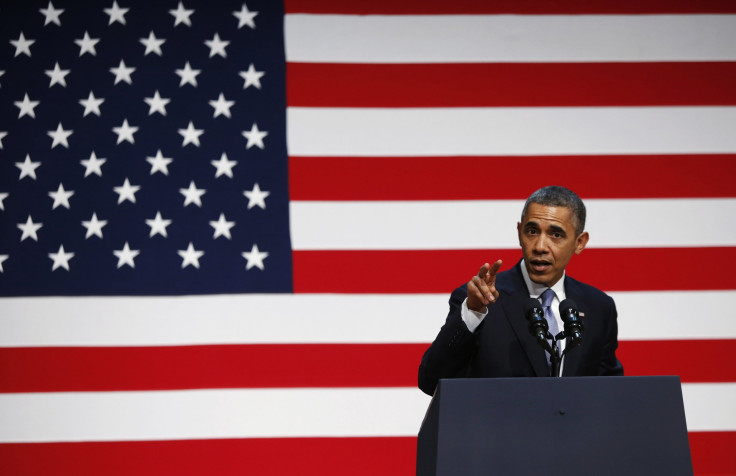What Obama Means When He Says He Wants To 'Degrade and Destroy' ISIS

President Barack Obama is set to make a speech Wednesday night to lay out the strategy for the international coalition that's coming together to fight the Islamic State, or ISIS, in Iraq and Syria. While we can only predict what the president may say in his address, we do know one thing already: that the U.S. intends to “degrade and destroy” the Sunni militant group.
“The endgame is degrade and destroy,” White House Press Secretary Josh Earnest said in a press briefing Tuesday, echoing the president's words from last week.
For days reporters have pressed spokespeople at the State Department, White House and Pentagon about the meaning of the catchphrase, but questions have been repeatedly dodged.
What does "degrade and destroy" actually mean in the context of ISIS, the militant group that has taken over large swaths of land in both Syria and Iraq?
Degrading and destroying would ultimately quell the threat ISIS poses to the stability of the region, and it would require taking military action in Syria as well as continuing airstrikes in Iraq.
Iraqi Prime Minister Haider Al-Abadi said in an address Wednesday with Secretary of State John Kerry in Baghdad that “the international community is responsible to protect Iraq and protect Iraqis in the whole region.”
The U.S. has conducted close to 150 targeted airstrikes in Iraq on ISIS fighters in recent weeks, most of them focused in the Iraqi Kurdistan region. It has yet to authorize strikes in Syria, but according to a New York Times report published Wednesday, Obama is ready to launch such strikes without congressional approval and possibly without approval from the Damascus regime.
The airstrikes would begin the process of destroying the militant group, but as the president has said in previous briefings, beating ISIS is going to require more than military action. It will require that the international coalition cut off funding streams to the group. It is unclear where ISIS gets its money, but many have implicated Qatar.
Degrading ISIS will also require that countries in the region prevent fighters from crossing borders. Part of that effort may come from the United Nations.
According to various media reports Tuesday, Obama is expected to seek a U.N. Security Council resolution Sept. 24 to crack down on ISIS. There are no details on what the resolution would entail, but any breach of that resolution would be a breach of Chapter 7 of the U.N. Charter, which allows the council to “determine the existence of any threat to the peace, breach of the peace, or act of aggression” and to authorize military action by member states to restore that peace.
“What’s happening in Syria is coming across to Iraq. We cannot cross that border. It’s an international border, but there is a role for the international community, for the United Nations to do that role,” Al-Abadi said Wednesday.
The Obama administration has also made it clear that it will rely heavily on the Iraqi government to take the fight against ISIS into its own hands at a certain point, with the guidance of the U.S. military. But the administration cannot rely on the Syrian government to do the same -- the U.S. simply does not have the relationship with the Assad regime. In fact, currently the U.S. is arming vetted opposition groups to fight the regime and ultimately remove Assad from power.
Secretary Kerry is wrapping up his visits in the region, where he spoke with leaders in Iraq, Jordan and Saudi Arabia. All three countries are likely to be involved in the coalition. Kerry's visit was just one of many steps the U.S. had to take to secure the backing it needed to do what it said -- to degrade and destroy ISIS.
© Copyright IBTimes 2025. All rights reserved.





















